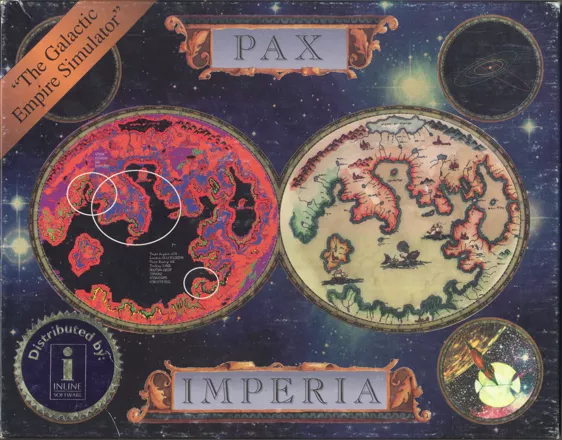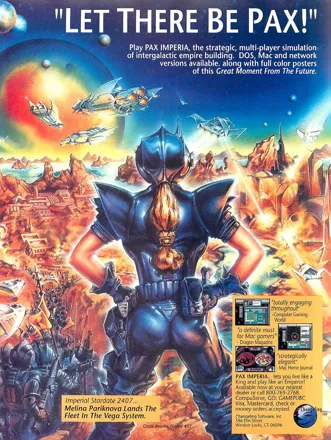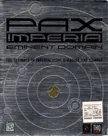Pax Imperia
Description
Pax Imperia is a turn-based science fiction space empire game playable by up to sixteen human players. Noteworthy elements of gameplay aside from the usual fare for games of its ilk (i.e. starship combat and exploration, colony-building, economics, etc.) include:
- Species customization with such features as specifiable atmosphere type (oxygen, nitrogen, carbon or hydrogen), temperature range and tolerance, and four percentile-rated attributes -- curiosity, efficiency, reproduction, and aggression.
- Detailed ship and ship systems design.
- Detailed personnel management for your ministers/advisers (including selecting from a pool of candidates with varying attributes, attitudes and loyalty à la Koei's strategy games, such as the Romance of the Three Kingdoms series).
- Separate development and management of up to nine distinct regions of each planet.
- Planetary surface operations (primarily raids, assaults and even the landing of hostile colonists into specific planetary regions of enemy-controlled planets).
- Migration between planetary regions (even by another player's colonists, leading to Migration Wars!).
- Five different mineral resources grouped into scientifically-valid categories (Ferrites, Pyrrites, Silicates, Crystals, and Radiants) to find, mine and trade with other space civilizations.
- Starships organized into and moved as fleets, not individual ships.
- Espionage options that include bribing or assassinating enemy minister.
- Detailed custom research (tech design) in which individual attributes of developed ship systems can customized (e.g. a dynamic range/accuracy graph for weapons).
Groups +
Promos
Reviews
Critics
Average score: 68% (based on 3 ratings)
Players
Average score: 3.3 out of 5 (based on 2 ratings with 1 reviews)
Great ideas, almost great execution
The Good
Although the 4X genre was well explored by the time Pax was released in 1992, it nevertheless stood head and shoulders above its stablemates at the time. The complexity of the simulation, realtime gameplay, and network support were simply lightyears ahead of what MOO and others were doing.
Consider, for instance, the ships. As is the case in many games, Pax allowed you to design ships based on available technologies, and those technologies would improve over time. Unlike other games, however, the user could actually design the technologies. For instance, one might design a gun that does most of its damage only at long distance, and none at all at short range. This would allow you to make ships that would keep their distance and "plink" at their targets. Or you might make a weapon with the same power but with short range, which would be cheaper to build. Then you would try to close with your targets and bludgeon them.
Or consider planets. In Pax, the solar systems moved in realtime, and included not only planets, but moons. Moreover, the planets, depending on their size, had multiple "territories". If you took over one territory, once the population grew they would naturally try to move into the surrounding territories. If these were inhabited by an opposing player, fighting would ensue.
Additionally, Pax's galaxies were "open" in the sense that one could fly anywhere. This contrasts with most games where ships in flight are basically nowhere. This had advantages; you could place ships with little other than sensors in deep space and use them as an early warning system. Or place one in an opposing solar system and use it to spy.
On top of all of this was a simple mouse-driven interface. Everything was done with point-n-click, and multiple windows. Double-clicking on a planet in the main Galaxy view opened a window showing the solar system around that star, double clicking on one of the planets in that window opened another window
The Bad
The main problem with Pax was its complexity! Most of the depth was unexplained in the manual, and trying to juggle so many tasks for so little gain always seemed pointless. I normally played with most of these options turned off (tech design, for instance). However, as these options could not be selected individually, only by "skill level", it meant that you often had to turn some on to get others - multiple territories on planets for instance. It was frustrating.
And then there's the bugs. Lots of them. So many that I found it rare to be able to complete a game without it dying. This, more than anything else, ruined the experience.
The Bottom Line
One of the classics of the early 4X genre, Pax still has some great ideas that have not been used in other games.
Macintosh · by Maury Markowitz (266) · 2011
Analytics
Identifiers +
Contribute
Are you familiar with this game? Help document and preserve this entry in video game history! If your contribution is approved, you will earn points and be credited as a contributor.
Contributors to this Entry
Game added by Luckspeare.
Game added December 27, 2006. Last modified July 9, 2024.











